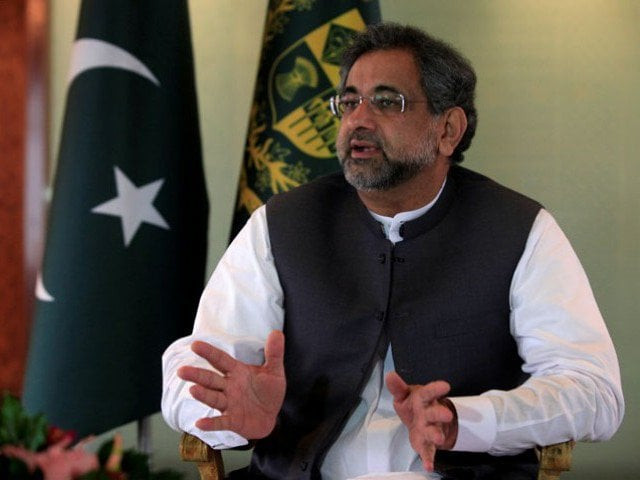PM inaugurates work on white oil pipeline
Project involving construction of 786km-long pipeline between Karachi and Mehmood Kot to complete by mid-2019

PHOTO: FILE
“Our annual domestic fuel consumption is consistently increasing by 20% … this project [WOPM] will help reduce the cost [of oil transportation across the country],” said PM Abbasi, according to a press statement.
The project would bring oil prices down by Rs1 to Rs1.5 per litre, he said, claiming that it would boost Pakistan’s economic growth.
The WOPM project – being built by Pak-Arab Pipeline Company Limited (PAPCO) – encompasses the construction of a 786km-long pipeline between Karachi and Mehmood Kot, in addition to a facility to store 255,000 litres of petroleum products, by mid-2019.
The PM assured transporters that the project “will back them in transporting the fuel, and their business will not be affected since tankers are the backbone of fuel supply”.
He said: “We have changed the country’s energy landscape in four years and today we are using best quality oil in the world.”
PM says K-E’s acquisition is ‘critical’ for foreign investment
The joint venture partners in the project are Pak-Arab Refinery Limited (PARCO), Shell Pakistan Limited (SPL), Pakistan State Oil Company Limited (PSO) and Total PARCO Marketing Limited (TPML).
“The white oil pipeline will transport refined petroleum products to central and northern regions of Pakistan, accounting for almost 60% of total [domestic] petroleum consumption,” a PARCO statement said.
PAPCO Chairman Muhammad Jalal Sikandar Sultan said: "The WOPM is not an ordinary project as it is built for commercial purposes alone. It is primarily a project to augment the energy infrastructure and streamline the country’s oil logistics.”
Enumerating the project’s immense socio-economic and strategic benefits, he said that it would help cheaper, faster and safer transportation of fuel; reduce road maintenance, congestion and accidents; and lower the levels of environmental pollution, leading to savings in health costs.
PAPCO CEO Shujauddin Ahmed said: “The WOPM project is being built by PAPCO under the directives of the Ministry of Energy.”
He said PAPCO had so far invested as much as $134 million for building and streamlining the country’s energy-related infrastructure, and the “WOPM is an outstanding example of public-private partnership”.
He said, “It increases the depth and reliability of the oil logistics, facilitating sustained economic growth besides strengthening the National Defence Factor. It also helps in boosting the confidence of Pakistani professionals in their ability to successfully implement similar mega-infrastructure projects in future.”
With the advent of better global reforms in transportation of white oil across various territories interlinked via land routes, “the safest and the most efficient and economical mode of transportation is through the pipeline structure,” he added.
“Unfortunately, consumers in Pakistan continue to bear the brunt of increased cost exposures due to inefficient means of transportation adopted in the country for transporting crude and refined oil inside Pakistan,” said the CEO.
In 2005, PAPCO was incorporated with a vision to conserve environment, infrastructure and national exchequer by adopting the most efficient, economical and safest means of transportation of refined oil across the country.
PAPCO is a pioneer in establishing the country’s sole white oil pipeline system. The pipeline system has a slated design capacity of 8 MMT per annum expandable to 12 MMT per annum after the inclusion of excess storage facilities.
The pipeline will contribute more than Rs115 billion in terms of savings for consumers across Pakistan.
With this significant investment, PAPCO will be able to contribute savings of more than Rs400 billion to domestic consumers, besides adding massive storage facilities and taking as many as 1,500 trucks per day off roads.



















COMMENTS
Comments are moderated and generally will be posted if they are on-topic and not abusive.
For more information, please see our Comments FAQ